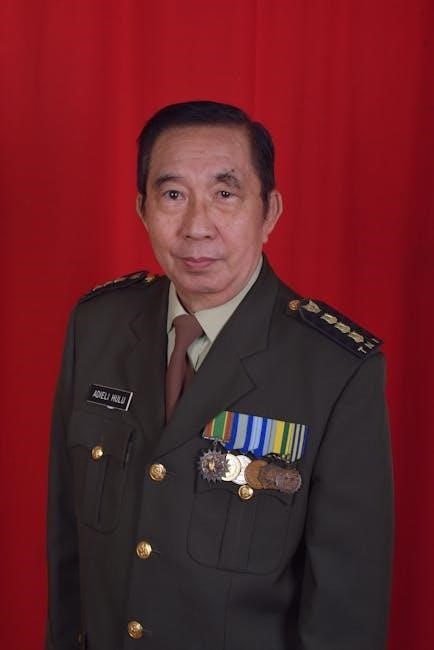The Army Noncommissioned Officer Guide serves as a foundational resource, outlining the critical role of NCOs as leaders, mentors, and tactical experts within the military structure.
1.1. Overview of the Role and Importance of NCOs in the Army
Noncommissioned Officers (NCOs) are the backbone of the Army, serving as leaders, mentors, and experts in their fields. They are responsible for training and guiding junior soldiers, executing missions, and maintaining unit cohesion. NCOs embody the Army’s values, fostering a climate of dignity and respect. Their leadership is essential for mission success and the development of a disciplined, capable force.
1.2. Historical Context and Evolution of NCO Responsibilities
The role of NCOs has evolved significantly since the Army’s inception. Historically, NCOs emerged as key leaders during the 18th century, taking on responsibilities for training and discipline. Over time, their duties expanded to include tactical leadership and mentorship. The Civil War and World War I further solidified their importance, leading to formalized training programs. Today, NCOs are integral to mission execution and soldier development, reflecting their growing influence and expertise.
Key Responsibilities of Army Noncommissioned Officers
Noncommissioned officers are pivotal in mission execution, training soldiers, and ensuring unit readiness. They foster a culture of accountability, discipline, and excellence within their teams.
2.1. Leadership and Mentorship of Junior Soldiers
Noncommissioned officers play a vital role in guiding junior soldiers, fostering professional growth, and instilling discipline. They lead by example, providing mentorship and training to ensure soldiers meet operational standards and achieve personal goals, ultimately strengthening unit cohesion and readiness.
2.2. Operational and Tactical Execution of Missions
NCOs are instrumental in planning and executing missions, ensuring tactical objectives are met. They oversee resource allocation, make strategic decisions, and maintain unit readiness. Their expertise ensures operations are carried out efficiently, aligning with mission goals and fostering success in diverse operational environments.

Leadership and Professional Development
Leadership and professional development are cornerstone competencies for NCOs, emphasizing essential traits like adaptability, resilience, and integrity. Continuous education and training ensure NCOs lead effectively.
3.1. Essential Leadership Traits for NCOs
NCOs must embody professionalism, integrity, and accountability. Strong decision-making, emotional intelligence, and adaptability are vital. Mentorship and fostering a climate of dignity and respect are cornerstone responsibilities, ensuring unity and mission success.
3.2. Professional Military Education and Training
NCOs undergo comprehensive professional military education and training, focusing on leadership development, tactical expertise, and decision-making. Programs like the Noncommissioned Officer Education System (NCOES) enhance their skills, preparing them for advanced responsibilities. Continuous learning ensures adaptability to evolving missions, fostering competent and resilient leaders capable of guiding soldiers effectively in diverse operational environments.
Career Advancement for Noncommissioned Officers
Career advancement for NCOs involves structured promotion processes, specialized training, and leadership opportunities, enabling them to progress in rank and responsibilities while contributing to the Army’s mission.
4.1. Promotion Process and Requirements
The promotion process for NCOs involves meeting specific requirements, including performance evaluations, leadership assessments, and time-in-grade standards. Soldiers must demonstrate exceptional skills, leadership potential, and adherence to Army values. Promotions are typically determined through centralized selection boards, ensuring fairness and transparency. Meeting these criteria ensures NCOs are prepared for increased responsibilities, aligning with the Army’s mission and operational needs.
4.2. Specialized Roles and Opportunities for Senior NCOs
Senior NCOs have access to specialized roles, such as Sergeant Major of the Army, offering unique leadership opportunities. They can serve as international advisors or instructors, shaping global military partnerships. Advanced training at institutions like the Sergeants Major Academy prepares them for strategic roles, ensuring they remain pivotal in maintaining Army traditions and operational excellence at the highest levels.
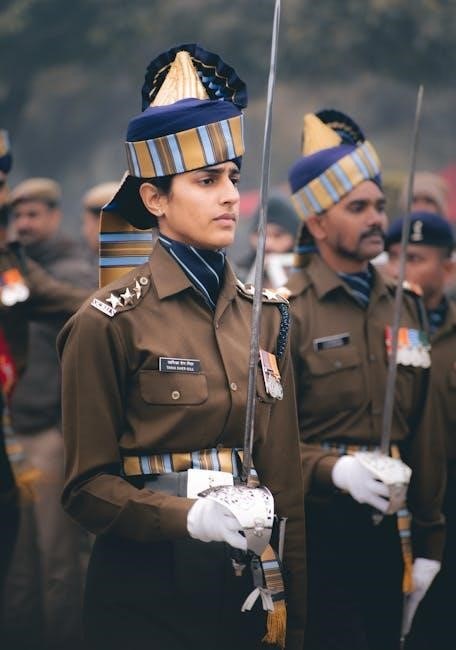
Effective Communication and Team Building
Effective communication and team building are vital for NCOs, ensuring clear direction, active listening, and fostering teamwork and mutual respect among soldiers.
5.1. Communication Strategies for NCOs
Effective communication strategies for NCOs include active listening, clear verbal and non-verbal cues, and adaptability to diverse audiences. NCOs must ensure messages are concise, understandable, and aligned with mission goals. They should foster open dialogue, encourage feedback, and maintain professionalism in all interactions. These strategies promote trust, collaboration, and a positive command climate, essential for unit cohesion and success.
5.2. Building Cohesive Teams and Fostering Camaraderie
NCOs play a vital role in creating cohesive teams by promoting mutual respect, trust, and shared goals. They foster camaraderie through team-building activities, shared experiences, and recognizing individual contributions. Encouraging collaboration and resolving conflicts constructively strengthens unit bonds. A positive team environment enhances morale, accountability, and mission readiness, ensuring soldiers work together seamlessly toward common objectives.
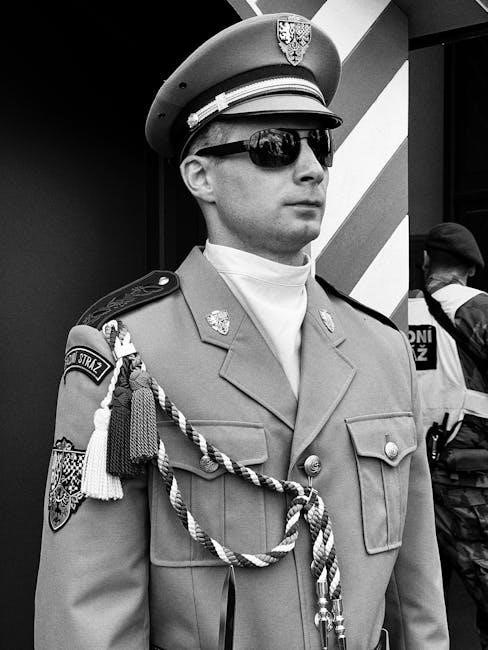
Ethical Leadership and the SHARP Program
Ethical leadership is crucial for NCOs, emphasizing integrity and accountability. The SHARP Program ensures a culture of dignity and respect, preventing harassment and assault across the Army.
6.1. Promoting a Climate of Dignity and Respect
Noncommissioned officers play a vital role in fostering an environment of dignity and respect within Army units. They ensure all personnel are treated fairly and inclusively, regardless of rank or background.
By adhering to the SHARP Program, NCOs promote zero tolerance for harassment and assault, creating a culture of trust and mutual respect that strengthens unit cohesion and mission success.
6.2. Roles of NCOs in Preventing Harassment and Assault
NCOs are instrumental in preventing harassment and assault by fostering a culture of accountability and zero tolerance. They ensure compliance with the SHARP Program, educate soldiers on policies, and encourage reporting of incidents.
By leading by example and addressing unacceptable behavior promptly, NCOs create a safe and respectful environment, safeguarding the well-being of all personnel and upholding Army values.
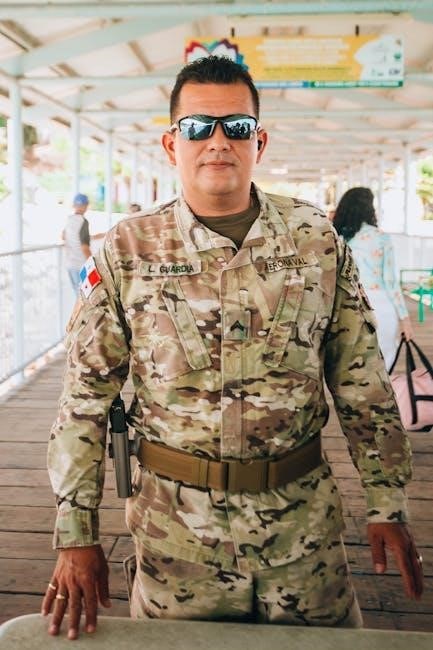
Combat Readiness and Tactical Expertise
NCOs ensure combat readiness by maintaining physical and mental fitness, while honing tactical expertise through continuous training and effective decision-making in dynamic operational environments.
7.1. Maintaining Physical and Mental Fitness
NCOs are responsible for ensuring their physical and mental readiness to lead by example, adhering to rigorous training standards, and fostering resilience. They prioritize fitness to maintain peak performance, ensuring soldiers are prepared for the physical and mental demands of combat. By leading fitness initiatives and promoting mental well-being, NCOs cultivate a culture of health and readiness within their units.
7.2. Tactical Decision-Making and Problem-Solving
NCOs excel in making swift, informed decisions under pressure, leveraging critical thinking and situational awareness to address complex challenges. They apply military doctrine and experience to solve tactical problems, ensuring mission success. By adapting to dynamic environments, NCOs demonstrate versatility and leadership, guiding soldiers to overcome obstacles effectively and achieve operational objectives with precision and confidence.
Mentorship and Counseling
Mentorship and counseling are vital for NCOs to guide soldiers in professional development and personal growth, fostering a supportive environment that enhances individual and team performance.
8.1. Guiding Junior Soldiers in Their Careers
NCOs play a pivotal role in guiding junior soldiers by setting clear career goals, providing constructive feedback, and identifying training opportunities. They create a supportive environment where soldiers feel empowered to seek advice and grow professionally. Effective mentorship fosters resilience, enhances skills, and prepares soldiers for future challenges, ensuring they are well-equipped to contribute to the Army’s mission.
- Encouraging soldiers to take ownership of their development.
- Offering guidance on professional growth and leadership skills.
- Providing feedback that aligns with personal and organizational goals.
- Fostering a culture of continuous improvement and learning.
8.2. Addressing Performance and Behavioral Issues
NCOs are responsible for addressing performance and behavioral issues promptly, ensuring soldiers meet standards. They identify root causes, provide constructive counseling, and document progress. This approach promotes a positive climate, accountability, and growth, fostering a culture of improvement and mission readiness.
- Using formal counseling and corrective training when necessary.
- Encouraging self-reflection and personal accountability.
- Documenting improvements and maintaining open communication.
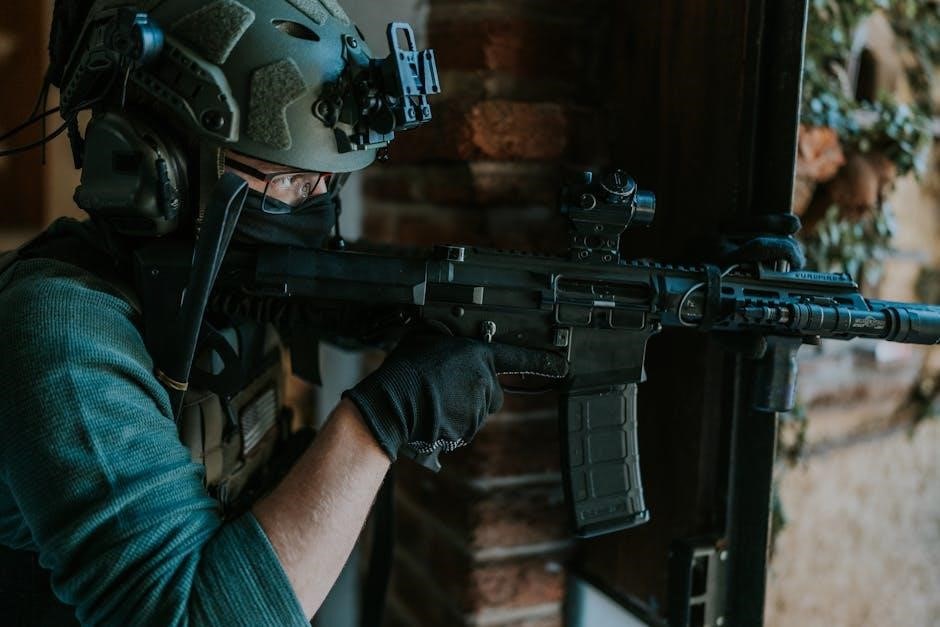
The Role of NCOs in Modern Military Operations
NCOs play a pivotal role in modern military operations by adapting to evolving mission requirements, collaborating with officers, and leading soldiers in dynamic, complex environments.
- Adapting to changing mission requirements.
- Collaborating with officers and enlisted personnel.
- Leading in complex operational environments.
9.1. Adapting to Changing Mission Requirements
NCOs must proactively adjust to shifting operational demands, ensuring seamless execution of missions. They leverage situational awareness, strategic planning, and decisive action to address unforeseen challenges, maintaining mission continuity and effectiveness in dynamic environments.
- Proactive adaptation to operational demands.
- Leveraging situational awareness and planning.
- Decisive action in addressing challenges.
9.2. Collaborating with Officers and Enlisted Personnel
NCOs serve as a critical bridge between officers and enlisted personnel, fostering collaboration and ensuring alignment with mission objectives. They maintain open communication, respect roles, and collectively drive unit success through teamwork and mutual respect.
- Fostering open communication between ranks.
- Ensuring alignment with mission objectives.
- Driving unit success through teamwork.
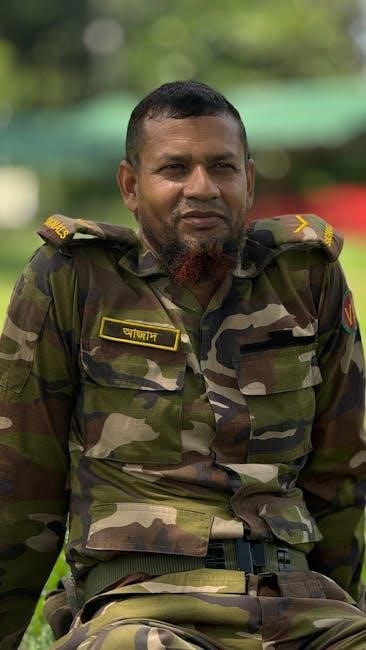
Professional Relationships and Networking
Professional relationships and networking are vital for NCOs to build trust, enhance collaboration, and foster a cohesive military community, ensuring shared goals and mission success.
- Building trust and respect among peers and leaders.
- Active listening and clear communication.
- Cross-functional collaboration for shared objectives.
- Leveraging mentorship and knowledge-sharing opportunities.
10.1. Building Relationships with Senior Leaders
Building strong relationships with senior leaders is essential for NCOs to understand organizational goals and align their efforts. Open communication, mutual respect, and proactive engagement foster trust and collaboration. NCOs should seek mentorship, stay informed about senior leader priorities, and demonstrate a commitment to mission success. This partnership enhances leadership effectiveness and supports a cohesive command structure, ensuring shared success across all levels.
10.2. Peer Networking and Knowledge Sharing
Peer networking and knowledge sharing among NCOs foster collaboration, innovation, and professional growth. By exchanging experiences and best practices, NCOs enhance their problem-solving skills and stay informed about emerging trends. Informal and formal platforms, such as professional forums or training sessions, encourage open dialogue and mutual support. This collective approach strengthens leadership capabilities and ensures a cohesive, adaptive, and resilient NCO corps.
The Legacy and Impact of Senior NCOs
Senior NCOs leave a lasting legacy through their leadership, mentorship, and dedication to excellence. Their contributions shape Army traditions and inspire future generations of military leaders and soldiers.
11.1. Inspiring Future Generations of Leaders
Senior NCOs play a pivotal role in shaping the next generation of military leaders through their exemplary leadership, mentorship, and unwavering commitment to excellence. Their experiences and wisdom serve as a foundation for junior soldiers to build upon, fostering professionalism, resilience, and ethical decision-making. By embodying Army values, they create a lasting impact on the development of future leaders, ensuring the continuation of strong military traditions and heritage.
11.2. Contributions to Army Heritage and Traditions
Senior NCOs significantly contribute to preserving Army heritage and traditions by upholding the institution’s core values, customs, and historical legacy. Their leadership and commitment to excellence ensure the continuity of time-honored practices, fostering unit identity and esprit de corps. By promoting professionalism and ethical standards, they strengthen the Army’s cultural foundation, inspiring pride and unity among service members and connecting them to the legacy of past generations.
The Army Noncommissioned Officer Guide underscores the vital role of NCOs as leaders, mentors, and pillars of military excellence, ensuring their enduring impact on the Army’s mission and legacy.
12.1. The Enduring Importance of NCOs in the Army
NCOs remain the backbone of the Army, providing leadership, mentorship, and expertise. Their role in fostering a climate of dignity and respect, as highlighted in the SHARP Program, underscores their foundational impact on mission success and military heritage, ensuring the Army’s continued effectiveness and legacy for future generations of soldiers.
12.2. Final Thoughts on the NCO Guide
The Army Noncommissioned Officer Guide is a vital resource, emphasizing leadership, professionalism, and the enduring legacy of NCOs. It underscores the importance of fostering dignity, respect, and accountability, as highlighted in the SHARP Program. By guiding career development and tactical expertise, the guide ensures NCOs remain pivotal in shaping the Army’s future, fostering a culture of excellence and unwavering commitment to mission success.
